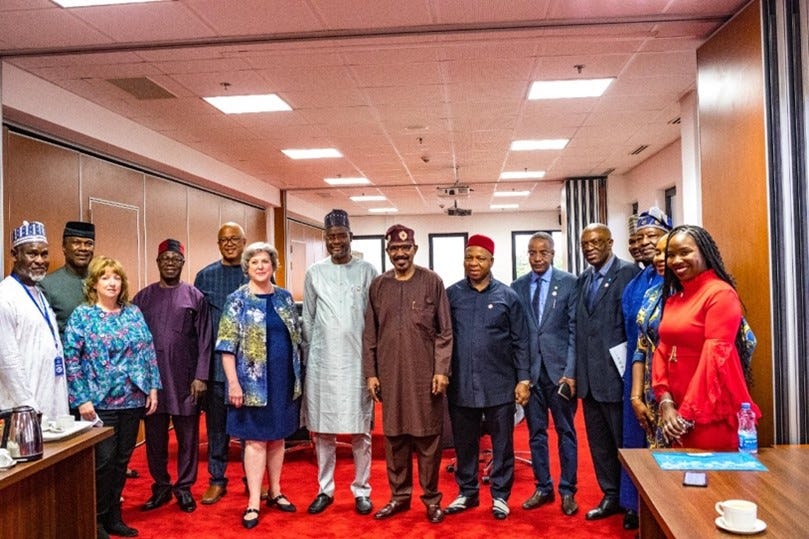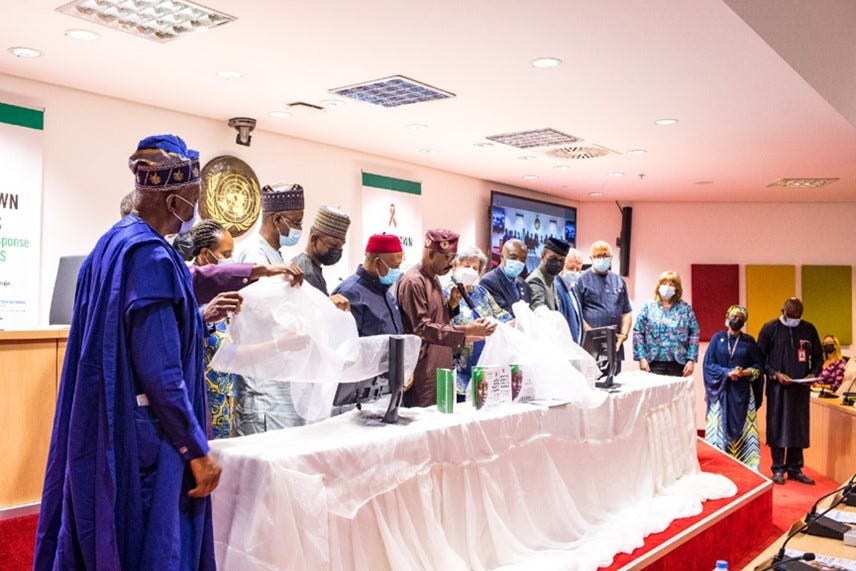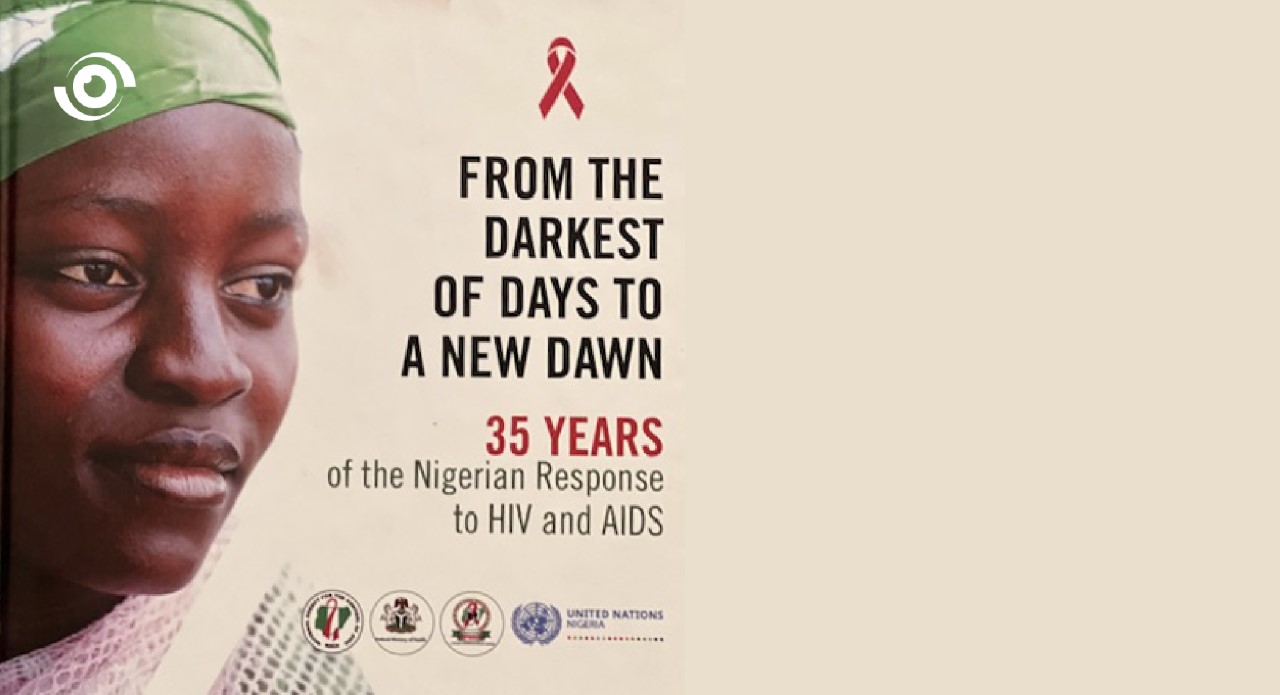From the Darkest of Days to a New dawn: 35 years of the Nigerian Response to HIV and AIDS is the title of a seminal book just published by a team of institutions that have been part of the AIDS response in Nigeria, for the past 35 years. The book was launched on the 14th of June 2022 to mark the departure of the Country Director of UNAIDS, Dr Erasmus Morah from Nigeria to a new assignment in China. During his busy tenure in Nigeria, he supported two historical events, the National HIV/AIDS Indicator and Impact Survey (NAIIS) which served to reposition the response to HIV and AIDS in Nigeria by finally providing accurate estimates for HIV prevalence in Nigeria and the leveraging of the HIV and AIDS infrastructure to support the COVID-19 response in Nigeria.
To kick off the book launch, Dr Morah noted that as Nigerians, we are not good at telling our own stories, and even worse at writing our stories. This book addresses this deficit to ensure that the story of the HIV and AIDS response in Nigeria is told, and told by those that have lived through, participated in the struggle and emerged out of it. With 136 authors, the stories in this book are told from all possible perspectives, from leaders to clinicians, from researchers and programme officers to the stories from the early advocates and critically the voices of people living with HIV (PLHIV).
However, the event was about much more than the book, it was about a journey. A journey from darkness and despair to life and hope. This point was made by Professor John Idoko, the Director General of the National Agency for the Control of AIDS (NACA) from 2009 to 2016, as he reminisced about his time as a HIV clinician at the University of Jos in the late nineties, when the outcome of the disease was inevitably a slow and painful death, after months of emaciation and wasting. Professor Idoko, one of the few people in the room who has been active from those dark days until today, took attendees through his journey from the early days of the AIDS response and the challenges they had to overcome.

The story of Nigeria’s AIDS response really has a turbulent past, and all this is well chronicled in the book. From the terrible stigma of the early days, to lack of access to treatment, to claims of cures, to a lack of interest by governments, to the days of activism and advocacy that led to the initial first rays of hope. Nigeria was actually the first country in Africa to launch a national Antiretroviral Treatment (ART) programme under the leadership of His Excellency Chief Olusegun Obasanjo, but it still took years to get our act together to implementation. Eventually, with support from the US Government, the Global Fund, resources became increasingly available, and the response was invigorated and so up until 2020, the number of PLHIV with access to ART stood at almost 1.5 million.
The highlight of the event was a memorial to those that had lost their lives over the last few years, members of the Network of People Living with HIV and AIDS in Nigeria (NEPWHAN). Many of them were advocates for care and treatment. The major testimony of most people living with HIV was the evolution of stigma. They recounted how much they were stigmatised, especially in the early years of the response.
Reviewing the book, it is clear to see that the HIV and AIDS response was very much an incredible collective effort that was multi-sectoral involving multiple stakeholders and multi-country. The response to this new disease required science to move rapidly and the delivery of services to be efficient. It required political leadership and for countries to act together in solidarity. It required a new public health paradigm of involving patients in the management, and not the isolation that was the norm for infectious diseases. From the first case that was detected in 1985 to the present day, many lessons have been learnt since the initial “denial”. While the early response, especially the financing of the response may have been development assistance-led, there was a sustained push for shared financing responsibility to increase sustainability in the response. There has been relative success on this in Nigeria, although the government can still do a lot more.
One of the major achievements of the HIV response in Nigeria was getting the numbers right. This was a problem that had plagued the response for many years as many people did not trust the data coming out of Nigeria. This was until the country made a major stride and “took the bull by the horns” and implemented the NAIIS study, the biggest of such surveys ever done anywhere in the world. This survey provided a reset of the response, and these stories are well represented in the book. Dr Sani Aliyu, the most recent past Director General of NACA reflected on the opportunities that the survey presented for the country. His remarks at the event, as succinct and sharp as they always are, reminded the country of the remarkable progress that had been made.
The importance of scientific data is reflected in the theme of the 2022 International AIDS Conference “re-engage and follow the science”, emphasising the importance of scientific data. The launch of the NAIIS study really was a critical turning point in the evidence-based response to HIV and AIDS in Nigeria. As the late Secretary-General of the United Nations famously said “without good data, we’re flying blind. If you can’t see it, you can’t solve it”.

The book launch was also graced by the United States (US) Ambassador to Nigeria, Mary Beth Leonard. The US has played an incredibly important role in the HIV and AIDS response in Nigeria, especially the budget it has allocated to the response through the US President’s Emergency Plan for AIDS Relief (PEPFAR), investing almost $6 billion since 2004. As an example, $410 million was spent on the HIV and AIDS response in 2017, 63.4% was from development assistance. The US Ambassador shared her excitement about the progress Nigeria had made, but also reminded us that the HIV response needed to be integrated into the normal healthcare provision in the country.
Finally, the book was unveiled, the story of Nigeria’s HIV and AIDS response was told as Nigeria said its goodbyes to one of the most influential leaders of the Joint United Nations Programme on HIV/AIDS (UNAIDS) in Nigeria. Dr Morah was generally recognised as a bridge builder, forging a strong partnership between the Government of Nigeria and the UN agencies. This trait was especially important during the COVID-19 response where he supported the work of the Presidential Task Force on COVID-19 (PTF) and the Nigeria Centre for Disease Control (NCDC) and ensured that the resources available for the HIV response were made available to the COVID-19 response.

While a lot of progress has been made, there is a lot more to be done. To close the event, the Minister of State for Health, Dr Adeleke Olorunnimbe Mamora reminded us of the need to pass the batton on from one generation to the next, but to always ensure that progress is made. Today as we commemorate National HIV testing day, we need to sustain our advocacy that HIV is not a death sentence, and knowing your status is the best way to ensure that the required care is made available. It is indeed a new dawn for the HIV and AIDS response in Nigeria and we have a collective responsibility to ensure that the gains made in the last 35 years are sustained.



Congratulations to the leadership, authors and Dr Erasmus for the progress made, writing the success stories and launching the book. Documenting what worked well and sharing the knowledge generated is equally important to improve service delivery.